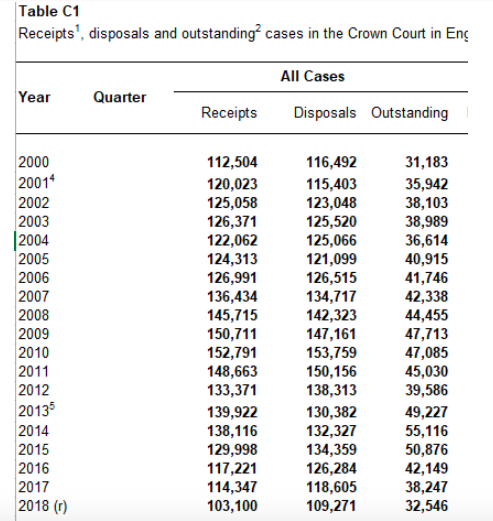I know it& #39;s Sunday, so apologies to go on, but the law change announced today to keep people locked up for EIGHT months BEFORE conviction is appalling & so& #39;s how it& #39;s been announced. Here& #39;s a short thread on the release from @MoJGovUK & @RobertBuckland https://www.gov.uk/government/news/suspected-criminals-held-for-longer-as-criminal-courts-recovery-plan-announced">https://www.gov.uk/governmen...
1. When people who are charged with criminal offences that they deny & are refused bail, there are maximum periods set in law for how long they can be detailed before trial - these are known as "custody time limits". In crown court, normally people can be held for 182 days.
Once the custody time limit expire prosecutors can apply for them to be extended, but unless there is a “good and sufficient” reason to extend them, defendants can be released on bail.
Many defendants have been in prison for longer than the 182 custody time limit and judges are already taking the decision to release some defendants on bail, with conditions, before their trial. https://www.thetimes.co.uk/article/coronavirus-suspect-released-as-judge-criticises-crown-courts-backlog-f5cbhnjpw">https://www.thetimes.co.uk/article/c...
4. The government is increasing the time that unconvicted people can be held in prison before trial for 182 to 238 days -- that& #39;s EIGHT MONTHS
5. The government says the change will "keep the public while courts recover from the pandemic". It will not keep the public safe, if the person detained is innocent, and the actual offender is still at large. The problem was not caused by the pandemic -- more on that later.
6. The government says the move "will protect victims". Complainants in criminal cases already wait months & years for trials. Keeping defendants in prison for even longer before trial will do nothing to protect those who are victims, who need cases to be dealt with much sooner.
7. The government says it "addresses the delays to jury trials that have been caused by the pandemic" -- I repeat, allowing defendants to be held in prison without trial for longer does nothing to address the delays. To do that, you need more courts or other spaces to hear trials
8. The new rules are not retrospective. They come into force on 28th September & apply to anyone arrested & remanded for a crown court trial AFTER that date. So they will do nothing to deal with those already in custody awaiting trial where custody time limits have expired.
9. Government says new custody time limits "will remain in place for 9 months. After which, current time lengths will resume." Where rights & liberties are temporarily reduced it& #39;s always a concern that governments will seek to make changes permanent, eps where it saves them £
In contrast to lord chancellor& #39;s comment here, 6 months in to the pandemic, the MoJ is not using existing courtrooms to the maximum capacity, has hired extra Nightingale courts, but only 3 are for crime & they are not being used efficiently.
11. The backlog of criminal cases has not been caused by the pandemic, something that the MoJ seems to admit here -- the problem has been ongoing for years. At the end of 2019, the were around 37,500 waiting to heard by crown courts.
12. These stats are from the MoJ and show backlog of crown court cases in England and Wales from 2000-2018. In 2019 it was 37,500. It reached a high of 55, 116 in 2014. https://assets.publishing.service.gov.uk/government/uploads/system/uploads/attachment_data/file/812556/ccsq-bulletin-q1-2019.pdf">https://assets.publishing.service.gov.uk/governmen...
13. By late July, there were 43,676 waiting to be heard by the crown court. The total backlog in crown and magistrate courts is 560,000 cases.
14. As I said before, backlog hasn& #39;t been caused by covid -but that& #39;s made it worse. Route cause is desire to save money & cut spend on criminal justice. Gov accepts "courts can& #39;t currently hear volume of cases required to reduce the backlog". Social distancing aside, here& #39;s why:
15. Since 2010 the Ministry of Justice has closed 295 courts -- almost a third of all courts in England & Wales, including over half of all magistrates& #39; courts and eight crown courts -- most recently the large and modern facility at Blackfriars Crown Court.

 Read on Twitter
Read on Twitter





